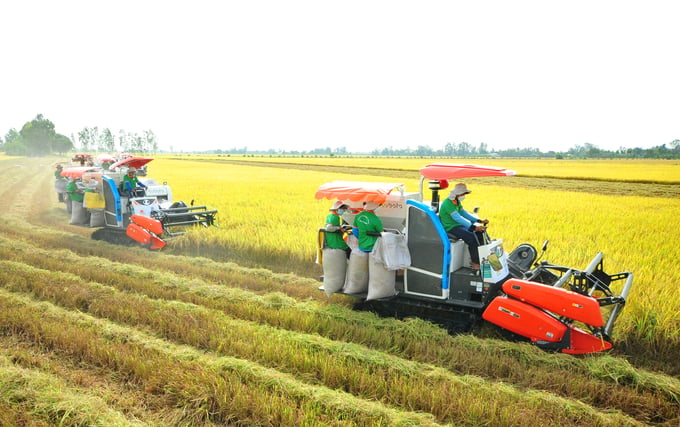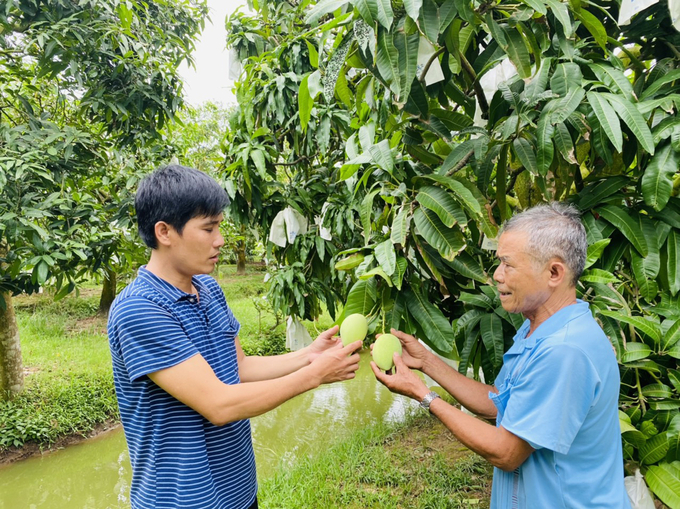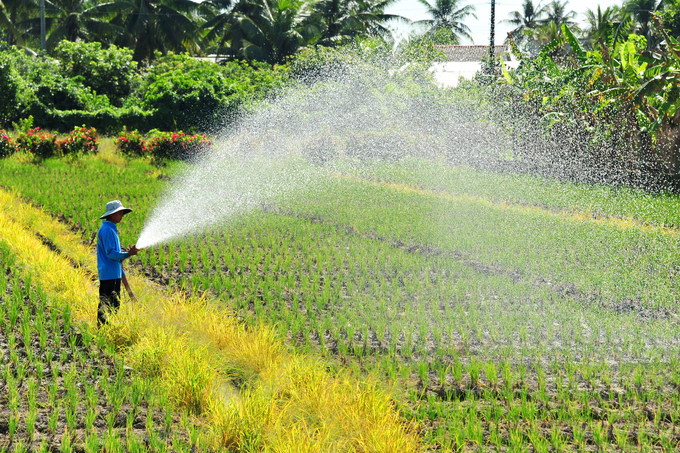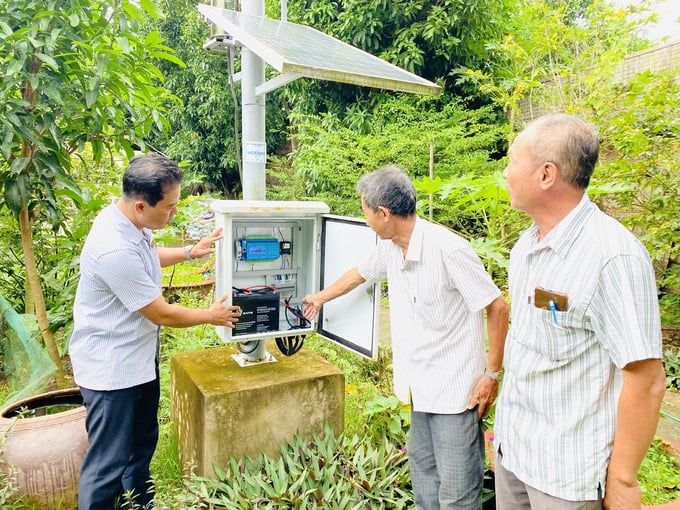June 17, 2025 | 07:12 GMT +7
June 17, 2025 | 07:12 GMT +7
Hotline: 0913.378.918
June 17, 2025 | 07:12 GMT +7
Hotline: 0913.378.918

Cooperatives are a key factor in helping Dong Thap successfully restructure its agricultural sector, aiming for sustainable production and market adaptation. Photo: Le Hoang Vu.
In the context of the nationwide push for agricultural restructuring, Dong Thap Province has emerged as a shining example, with agricultural cooperatives playing an increasingly important role. Instead of continuing with small-scale, fragmented production as was the norm in the past, these cooperatives have helped connect farmers to the market, introduce scientific and technological advances, add greater value to agricultural products.
According to Mr. Nguyen Van Vu Minh, Director of the Department of Agriculture and Rural Development of Dong Thap, the province currently has 165 cooperatives in operation, accounting for 16% of all cooperatives in the Mekong Delta region. This figure highlights the significant progress Dong Thap has made in developing cooperative economics. These cooperatives have played a pivotal role in transforming traditional farming models into larger, more coordinated and sustainable systems.
For example, Binh Thanh Cooperative is focusing on developing a large-scale rice production area, covering nearly 100 hectares. The cooperative will tightly manage every step of the process, from providing high-quality seeds and agricultural materials to supervising farming techniques and overseeing the harvest.
Mr. Nguyen Van Doi, Director of Binh Thanh Agricultural Service Cooperative (Lap Vo District), shared, "Previously, fragmented production made it difficult for farmers to access the market and gain stable income. Now, the cooperative helps guide farmers to sow the same rice variety, ensures quality control, and reduces production costs by 650-1.000 VND per kilogram (approximately 2-4 cent) compared to external prices. This enables local farmers to increase their income and improve their quality of life".
Additionally, the smart rice farming model implemented by the My Dong 2 Agricultural Service Cooperative in Thap Muoi District, in collaboration with Rynan Smart Fertilizers, has proven effective in helping farmers adopt advanced technologies. This has resulted in reduced production costs and increased economic efficiency.

The cooperative has helped farmers connect with the market, apply scientific and technological advances, and increase the value of agricultural products. Photo: Le Hoang Vu.
One of the successful models is Tan Cuong Cooperative (Tam Nong District), which stands out due to its modern infrastructure and diverse range of services. The cooperative has received an investment of 500.000 USD from the VnSAT project, funded by the World Bank, with an additional contribution of 666.000 USD from the cooperative itself. This project has established two storage facilities, five drying ovens and a rice milling factory. These facilities not only enable the cooperative to purchase and process rice but also help local farmers store their rice for up to two months during low price periods, thus preventing them from being pressured by traders offering low prices.
In addition to rice production, cooperatives have diversified their agricultural products. For example, Tan Binh Cooperative has implemented a model that uses greenhouse technology and drip irrigation to produce high-quality, disease-free chili pepper seeds, which have shown remarkable productivity. Meanwhile, My Xuong Cooperative in Cao Lanh District has launched the "My Mango" project, where they have adopted 4.0 technology, traceability systems and e-commerce platforms, allowing Dong Thap mangoes to enter more demanding consumer markets.
Alongside the growth of cooperatives, Dong Thap has also pioneered the "Farmer Clubs" model, which is based on voluntary, self-managed community groups. The clubs follow the motto “Diligence - Self-reliance - Cooperation”. They serve not only as spaces for sharing farming knowledge but also as the foundation for establishing cooperatives. To date, Dong Thap has set up 145 farmer clubs with over 7.600 members. Of these, 38 cooperatives have been formed based on these grassroots organizations.
Mr. Nguyen Phuoc Thien, Vice Chairman of the Dong Thap People's Committee, emphasized: “Models like the farmer clubs and cooperatives not only help farmers unite and cooperate, but they are also the key to achieving sustainable rural economic development. We are confident that the success of these models will drive the cooperative economy in the province to grow even more strongly in the future".

To date, Dong Thap has established 145 farmer clubs with over 7.600 members, of which 38 cooperatives have been formed from these grassroots foundations. Photo: Le Hoang Vu.
The role of cooperatives in Dong Thap extends far beyond simply organizing agricultural production; they have become a vital "link" in the entire agricultural supply chain. These cooperatives act as a bridge between local farmers and businesses, playing a crucial role in forming sustainable value chains. By doing so, they help enhance the branding and competitiveness of Dong Thap’s agricultural products. Mr. Nguyen Phuoc Thien, Vice Chairman of the Dong Thap People’s Committee, further emphasized that cooperatives are an essential solution for agricultural restructuring, new rural construction and climate change adaptation. Without cooperatives, farmer groups or local farmer clubs, it would be extremely difficult to implement new production methods and technologies for the local farming community.
In addition to the important role that cooperatives play in the agricultural economy, Dong Thap has also been proactive in leveraging both government funds and international resources to support their growth. Notable initiatives include the VnSAT Project and Public-Private Partnership (PPP) projects, which aim to improve cooperative development and ensure sustainability. Moreover, the provincial government has launched various programs focused on human resource training, market promotion and overcoming challenges related to the integration of cooperatives with private businesses. These efforts have created a strong foundation for the continued development and success of agricultural cooperatives in Dong Thap.

Without cooperatives, farmer groups or farmer clubs, changing production methods for local farmers would face significant difficulties. Photo: Le Hoang Vu.
It can be confidently stated that cooperatives play a pivotal role in the successful restructuring of the agricultural sector in Dong Thap, driving the transition toward sustainable production and ensuring better market adaptability. Through substantial investments in infrastructure, appropriate support policies and strong cooperation between various stakeholders, cooperatives have not only enabled farmers to boost their incomes and improve their livelihoods, but also helped to protect the environment.
Looking ahead, with clear development plans coupled with the strong commitment from both local authorities and farmers, Dong Thap is set to continue as a leading region in the development of cooperative economies and the establishment of sustainable agricultural value chains.
The Dong Thap Provincial People's Committee has recently issued a detailed plan for implementing the "Project to enhance the adaptive capacity of agricultural cooperatives to climate change", which will run until 2025. As explained by Mr. Nguyen Phuoc Thien, the goal by 2025 is for 100% of agricultural cooperatives in the province to be educated and trained on climate change awareness. In addition, they will be informed about the measures to adapt to climate change in the production, business, processing and storage of agricultural and aquatic products.
Additionally, five cooperative models will be developed to apply effective climate adaptation measures, with the aim of researching, learning from and replicating these models.
Translated by Phuong Linh

(VAN) The UNESCO Global Geopark revalidation of Non nuoc Cao Bang and the transition to a two-tier administrative model are presently undergoing a pivotal moment in Cao Bang, the northernmost province of Vietnam.
/2025/06/13/5330-2-004539_953.jpg)
(VAN) Changing policy mindset and removing investment barriers are urgent requirements to open up new development space for enterprises in the agricultural sector.

(VAN) The areas include the restoration of five million hectares of marine ecosystems.

(VAN) Dr. Le Van Nguyen, Director of the Institute of E-Commerce Management (ECM), emphasizes the potential for green development through the cultivation of fruit trees, particularly in provinces such as Son La.

(VAN) VAAS and numerous Vietnamese enterprises have signed cooperation agreements with Japanese partners to promote agricultural technology and trade connectivity.
/2025/05/29/5625-12-214801_567.jpg)
(VAN) Provincial mergers in the Mekong Delta promise to streamline administration, expand inter-provincial raw material areas, and foster close linkages in agricultural value chains, benefiting both businesses and cooperatives.

(VAN) Merging Mekong Delta provinces contributes to the expansion of agricultural raw material areas, addressing previous constraints caused by provincial boundaries. Additionally, this expansion will reduce costs and strengthen linkages between businesses, cooperatives, and farmers.